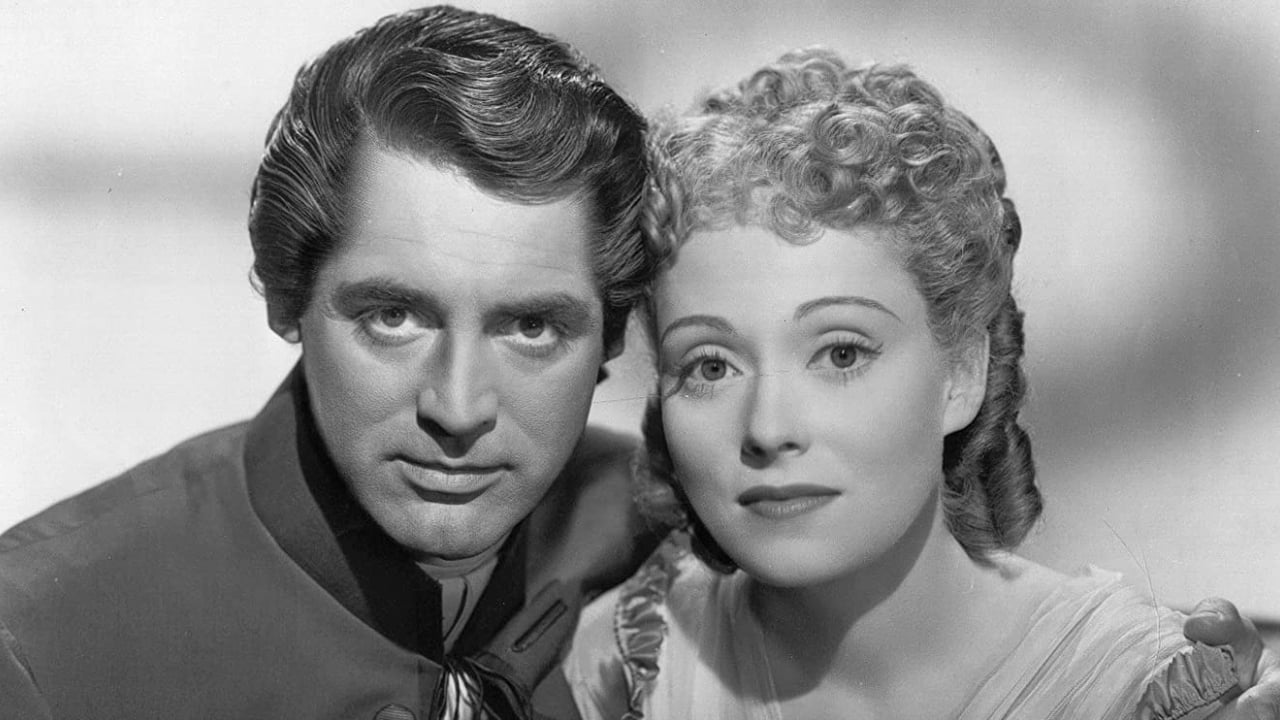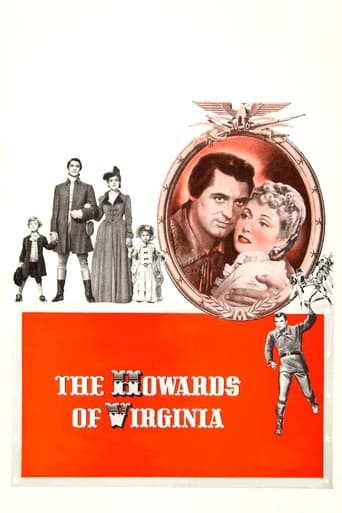

The film makes a home in your brain and the only cure is to see it again.
... View MoreThe tone of this movie is interesting -- the stakes are both dramatic and high, but it's balanced with a lot of fun, tongue and cheek dialogue.
... View MoreThe story-telling is good with flashbacks.The film is both funny and heartbreaking. You smile in a scene and get a soulcrushing revelation in the next.
... View MoreIf you're interested in the topic at hand, you should just watch it and judge yourself because the reviews have gone very biased by people that didn't even watch it and just hate (or love) the creator. I liked it, it was well written, narrated, and directed and it was about a topic that interests me.
... View MoreProducer: Frank Lloyd. Copyright 14 September 1940 by Columbia Pictures Corp. New York opening at Radio City Music Hall, 26 September, 1940. U.S. release: 19 September 1940. Australian release: 10 April 1941. 13 reels. 10,416 feet. 115½ minutes.Australian release title: The TREE OF LIBERTY.SYNOPSIS: Backwoods surveyor marries an aristocratic Virginian.COMMENT: How my grandfather would have enjoyed this film! Unfortunately, he never saw it, not realizing that the Australian title masked a fairly faithful account of the American Howards. Admittedly, Cary Grant is atrociously miscast and feels he is obliged to render every line as loudly as possible in a curious mixture of Irish and Cockney accents. His co-star Martha Scott is also not wholly enjoyable, being both too stiff and too dull for the albeit conventional role of vivacious, lively heiress.Some of the support players are equally maladroit, particularly Richard Carlson's Tom Jefferson, and Irving Bacon, almost unrecognizably miscast as an Olin Howland-type backwoodsman.Nonetheless, ranged on the credit side of the acting ledger, Sir Cedric Hardwicke gives an unforgettably powerful performance as the embittered Fleetwood, one of his most memorable studies in well-rounded heavies. He's a malevolent character in many respects, but you can't help feeling sorry for him. That's real acting. Probably Hardwicke's best role ever, eclipsing even his hard-hearted Ralph Nickleby. He certainly wipes out the rest of the cast - with the exception of Alan Marshal who makes an excellent foil as the tippling Roger.If (Sir Cedric aside), the acting is largely second-rate, part of the fault can be attributed to the hokey script by Sidney Buchman of all people (Mr Smith Goes To Washing¬ton, The Talk of the Town, A Song To Remember). Its drama is forced, its humor unfunny, its dialogue often embarrass¬ingly amateurish. Hard to believe it's the same writer who did such a witty, polishing job on The Talk of the Town.As a director, Frank Lloyd is not always skilful with players. Action and spectacle are his forte. Fortunately, The Howards of Virginia has its share of such scenes. Moreover, Lloyd is joined by Hollywood's most inventive montage expert, Slavko Vorkapich, in creating some thrilling pre-Revolutionary episodes of dispatch-riders galloping furiously to the assembly. The sets and locations are often breathtaking.Best of all, is the music. Richard Hageman has constructed a wonderfully stirring score. The opening, credits in which the title card flashes on the screen orchestrated by the Liberty Bell, is one of the great moments of forties' cinema.
... View MoreSad that so many Cary Grant fans had their bubbles burst. It certainly was strange to see him play such a character, but did anyone have any problems with the actors who played the other backwoodsmen? Grant could not have played his dapper persona while being from the Shenandoah Valley, especially in scenes with those crude and embarrassing frontiersmen and women. They must have been extras. I doubt if that kind of acting is taught at UCLA or Princeton. One reviewer was critical of the director because the irony of Matthew Howard turning into a kind of Fleetwood Peyton was not portrayed. But from early on in the movie, Tom Jefferson and Matt Howard thought it would be grand to develop the 1,000 acres in the Shenandoah Valley into a PLANTATION. That was the American Dream, to achieve success through hard work. Then it meant that the most successful planter had slaves and went to Congress. But Matt Howard didn't want to run at first, and when pressed said he would go if only to improve the roads and bridges and repeal the Stamp Act. He had no thoughts of aristocratic power unlike Fleetwood.Anyone see John Wayne in The Searchers? Early in the film he wanted to murder his niece Natalie Wood because she was kidnapped and lived with the Redskins. He too was playing a character from an earlier time when there were other mores.Talk about provincialism! It's thriving even today.Collectivism versus individualism is being played out today on these movie reviews. Am I being too critical to suggest that those who are most critical of this move are doing so on political rather than on artistic grounds?July 4, 2009I watched the film again this year on TV. It's becoming an Independence Day (don't call it the 4th of July) classic, something like Jimmy Stewart's the 25th of December classic, "It's a Wonderful Life."I can't answer all the other reviewers individually here. Basically, I suspect that the "Cary Grant as Matt Howard" detractors are either in love with the suave Cary Grant or are against the political principles of Matt Howard. His performance in the beginning as a backwoodsman was energetic and realistic. He pulled no punches. The depiction of his friends as toothless and illiterate, and his love and respect for them was outstanding. His speechifying at the conclusion, espousing the distinctly American virtues of freedom, self-reliance and industriousness, sounded heartfelt. I don't know what Cary Grant felt later about the film, but the film is essential now both as a political debate and a period piece. Read the reviews at the Cary Grant web site: some of them written when the film came out in 1940 when we were allied with England in WW II. Think about today's political climate, what with tea-partyers (the original Boston Tea party was referred to in the movie) and the current debate on levels of taxation and government controls (the Stamp Act was also a plot element in the movie). Also, in case there's some doubt, Cary Grant wasn't always perfectly elegant. Early in his career he played a heavy. "In a string of films he had supporting parts, including the heavy who nearly destroys Marlene Dietrich in Blonde Venus 1932) and Mae West's foil in She Done Him Wrong (1933) and I'm No Angel (1933)." Later in his career, after he had established his elegant style, he played in a couple less-than-exemplary roles, costarring with Jayne Mansfield in 1957 in "Kiss Them for Me" and playing a heartless swindler and a Cockney in 1943 in "Mr Lucky." I don't see why he can't play against type in this patriotic film. Maybe he was still trying to establish his bona fides as an actor, or he could have believed in the principles of Matt Howard. In support of the second theory, Cary Grant became an American citizen on June 26th, 1942. Might not he actually believed the lines he was reading because that is what they were teaching our naturalized citizens in those days?July 4, 2010
... View MoreThe only reason I watched this film was to see my Grandfather. He is the guy who hands Cary the bottle of booze in the house, then is shown again when Martha Scott comes out of her room and sits at the table. He is standing just to the left of her (screen left). But back to the flick. Cary was too hyper in this film. Everything he did was at 100 miles per hour! And that hair was the worst! Oh well. All of Cary's other movies more than make-up for this one. By the way, my grandfather's name is Dan White (I) (imdb.com)
... View MoreSuch a thing as outright disastrous Cary Grant exists in the form of the emotionally unstirring catastrophic period piece which engages top talent for all the wrong reasons.The screenplay remains the biggest fault of the movie, due to mindless indulgence of the writer about Virginian high society and love that comes in the most rigid form of unconvincing passion. Frank Llyold's idiotic and alarmingly dated direction doesn't help ailing elements any further. Cary Grant would have been better off fronting his appearance under a different name. He looks ridiculous in a long haired wig, and with an unconvincing accent, seems an embarrassment amongst the most elegant folk in Virginia.After a succession of brilliant Cary Grant projects at Columbia, the dated ill fate and dull proceeding of this movie makes one wonder at the film's very existence.The best movie of *1927*. The pioneers of sound could have made more interesting short work of this as a cinematic experiment. Maybe it would have been more successful.Rating: 4/10
... View More